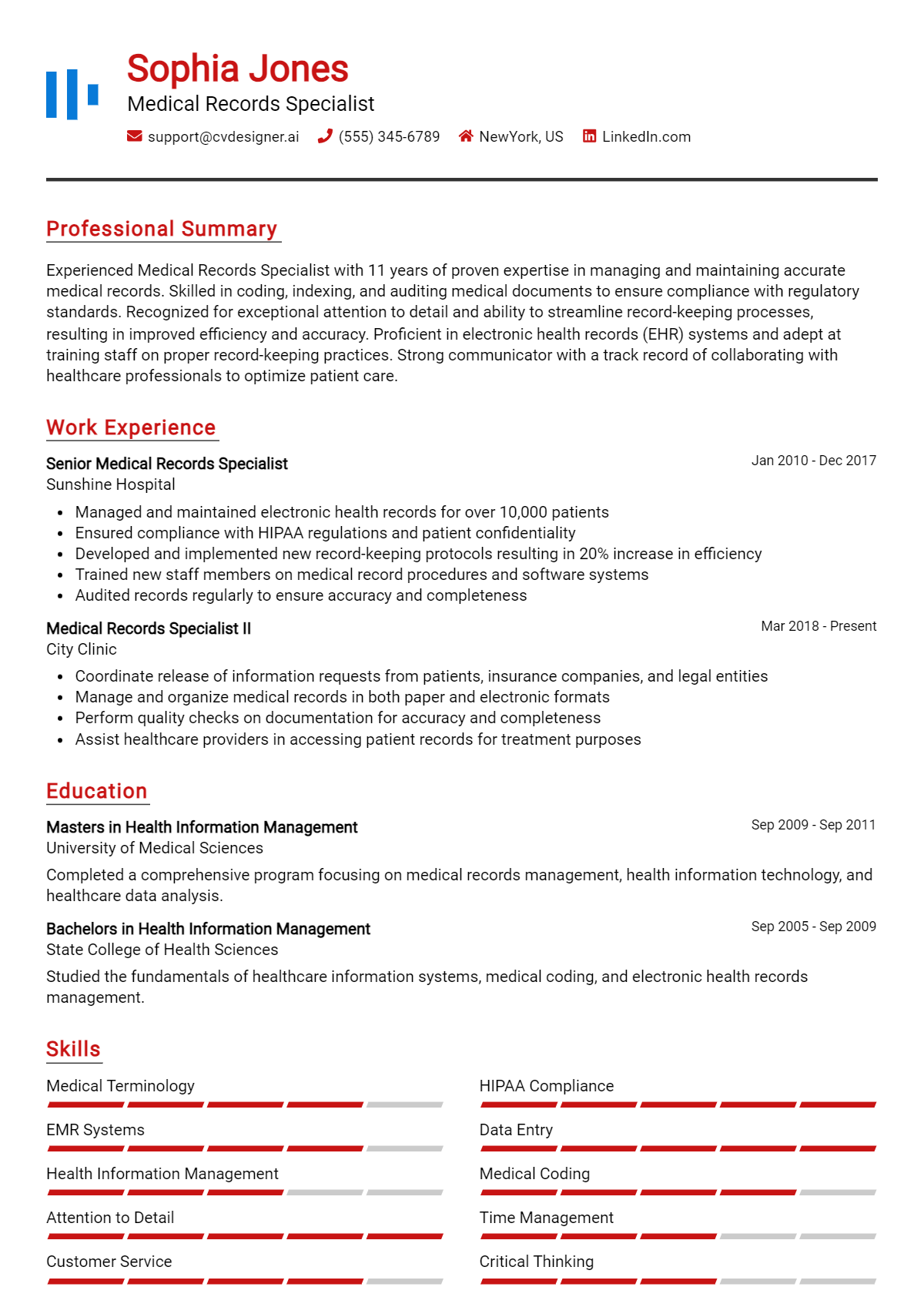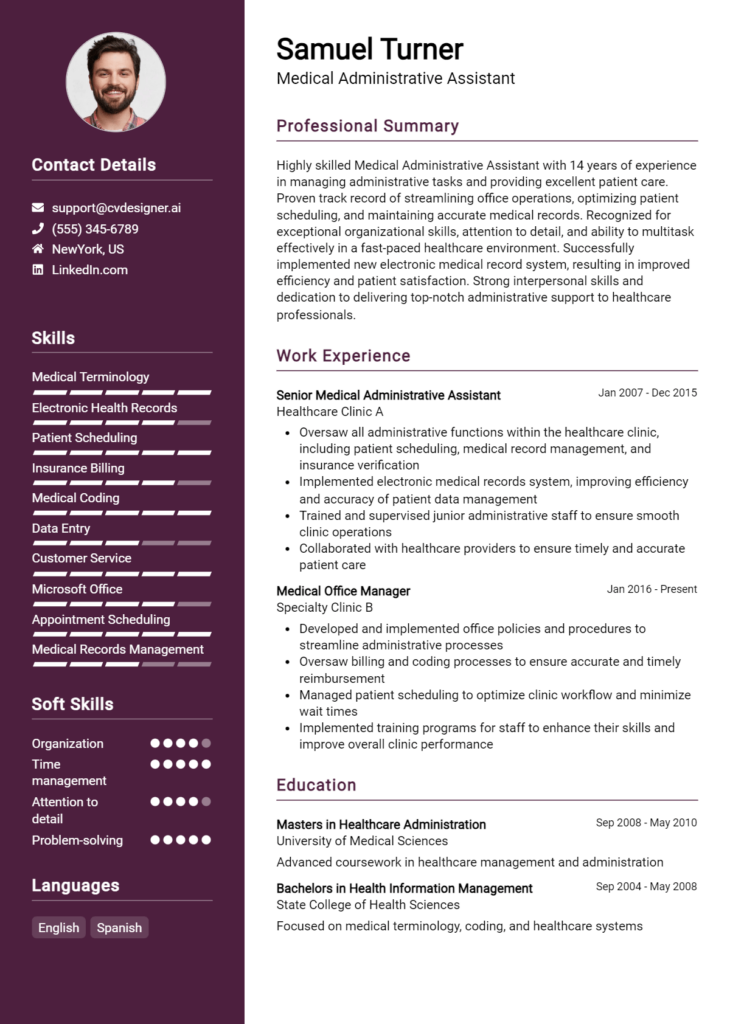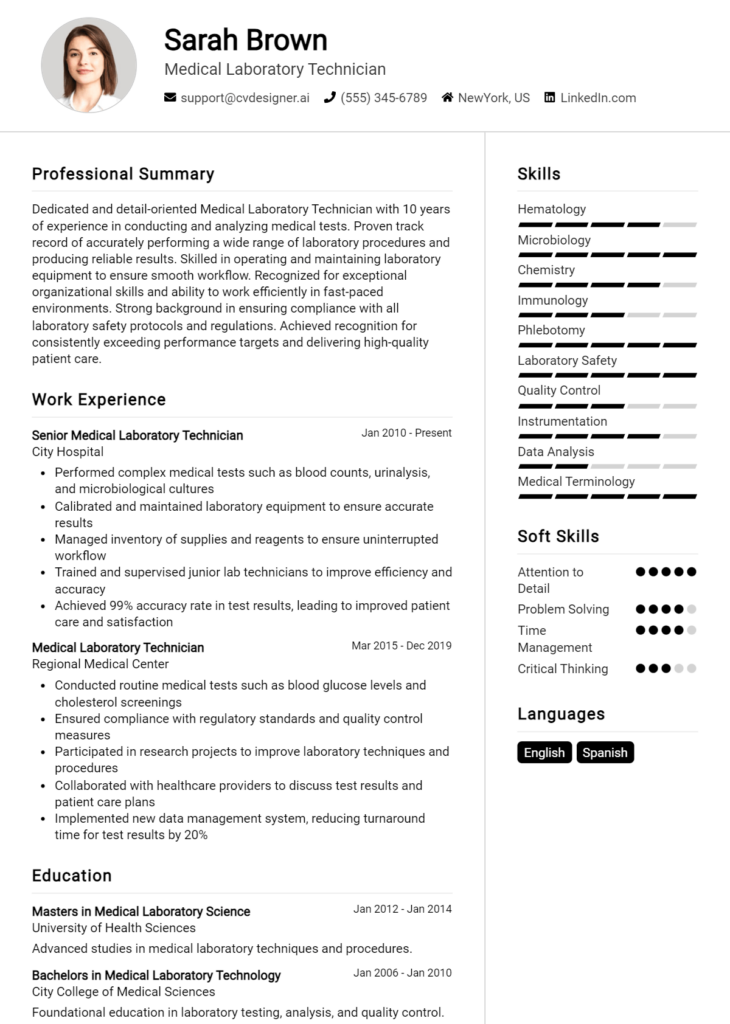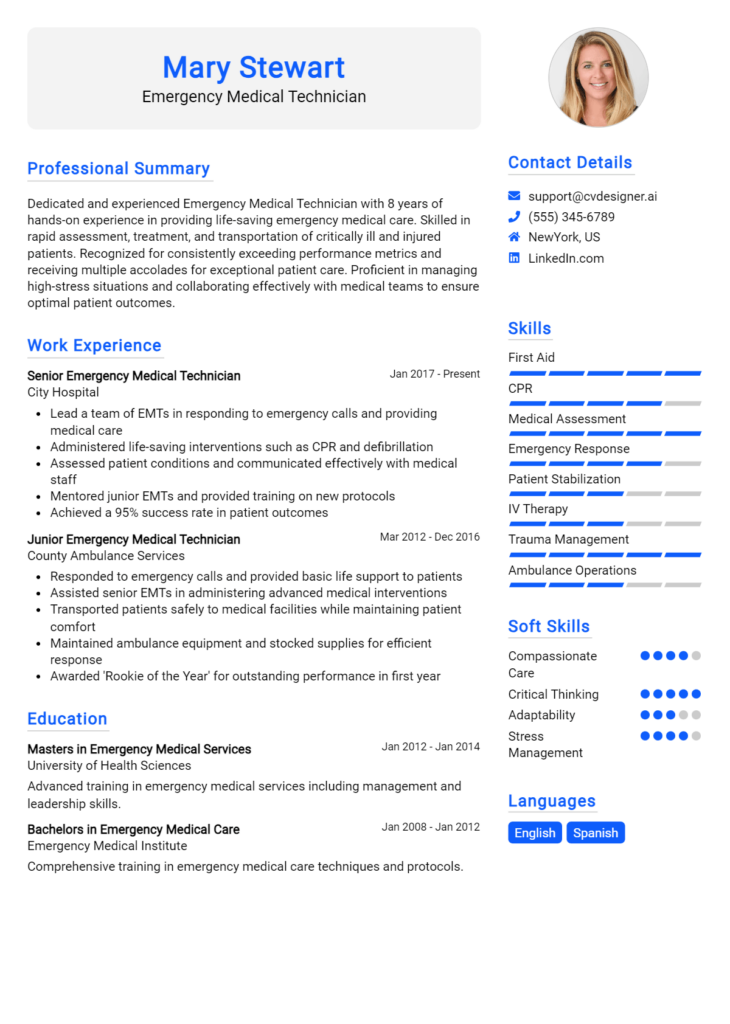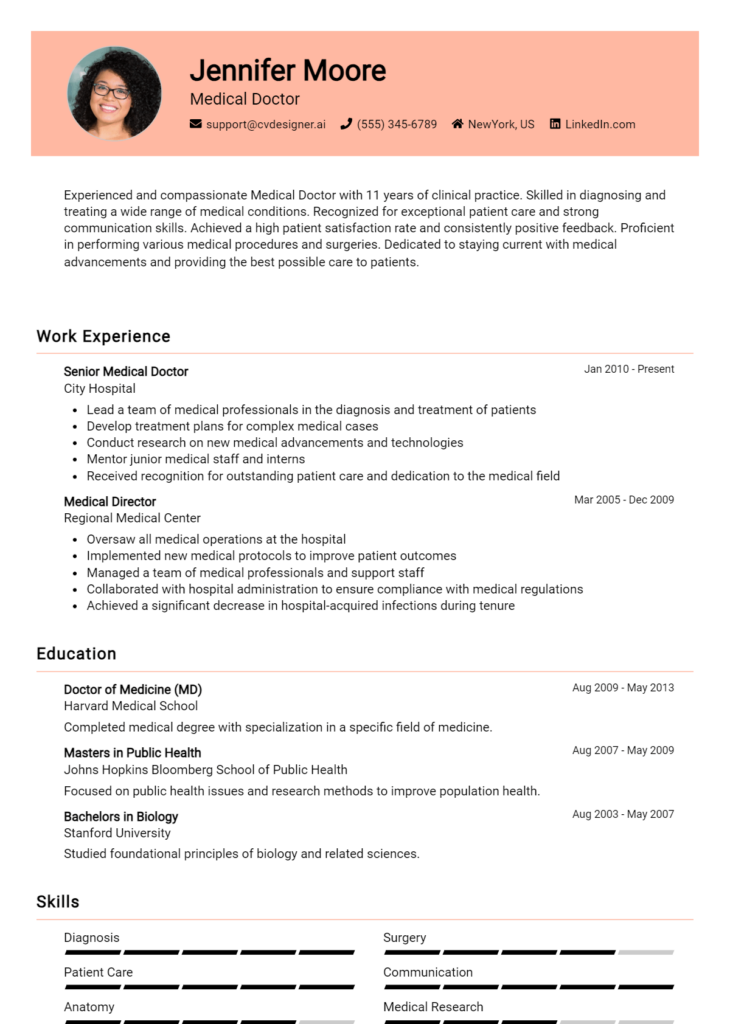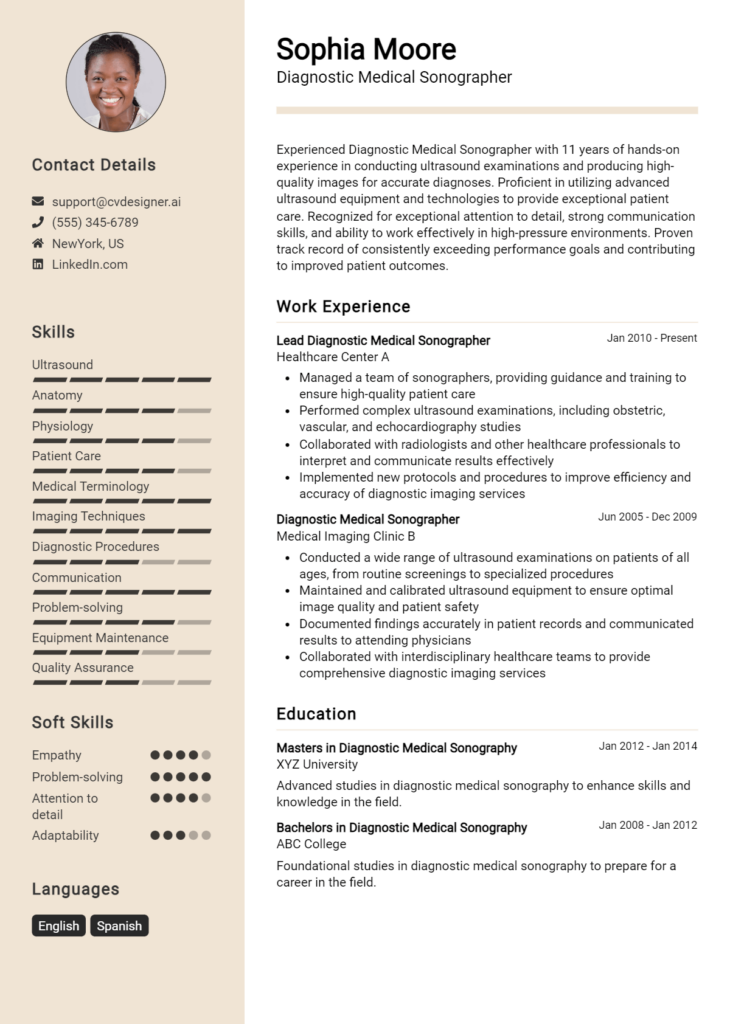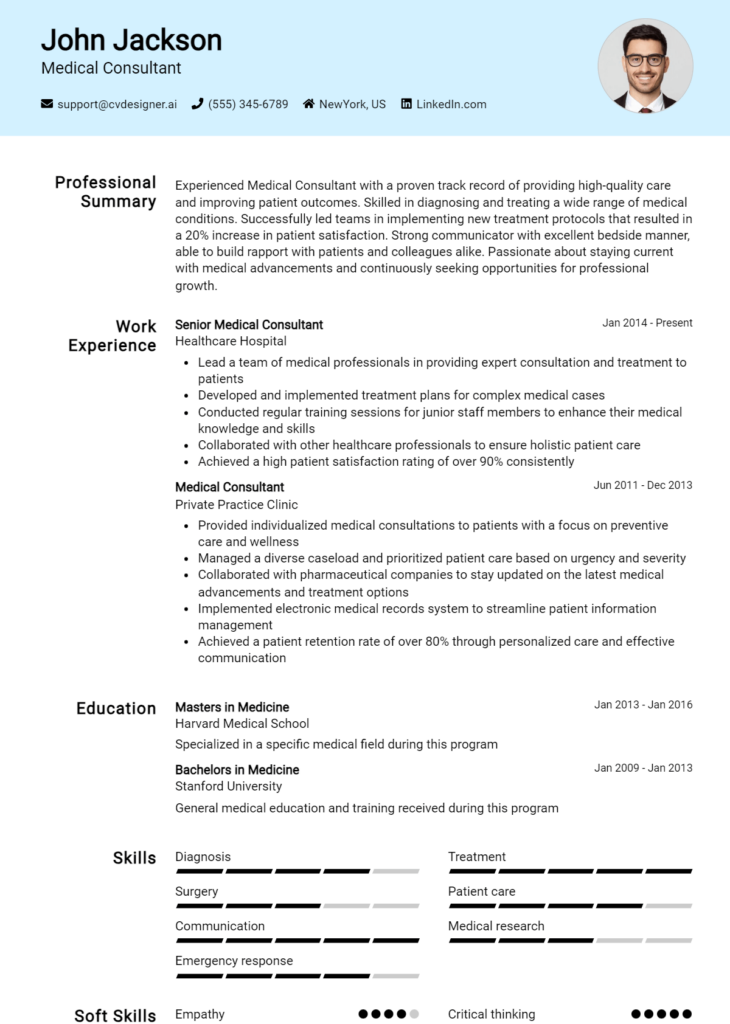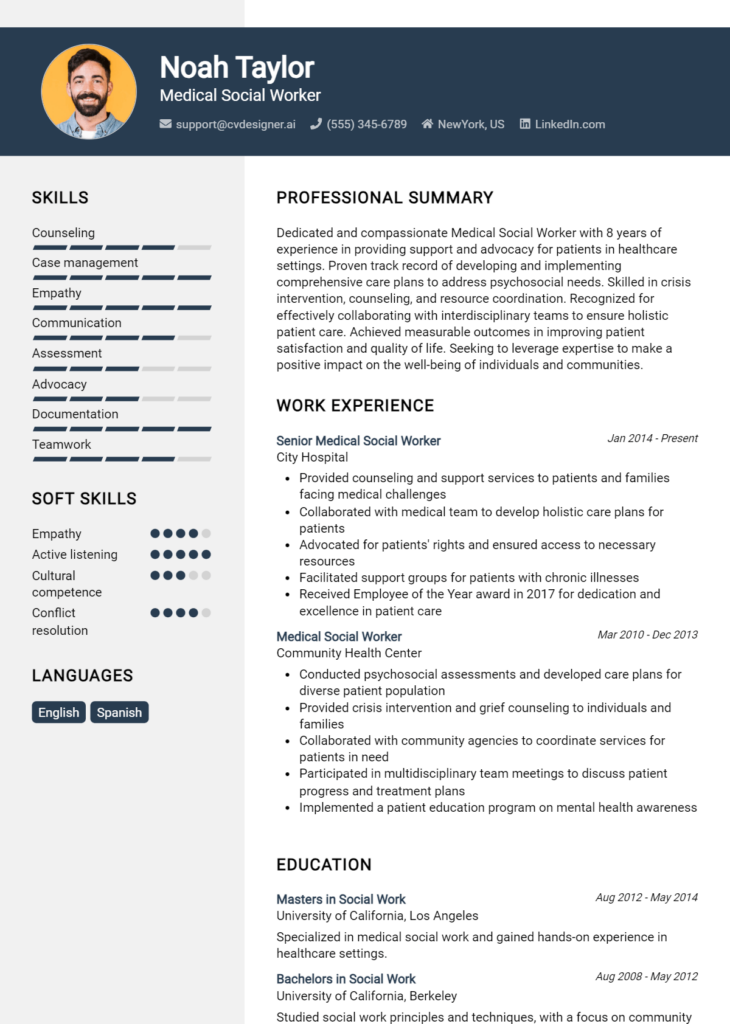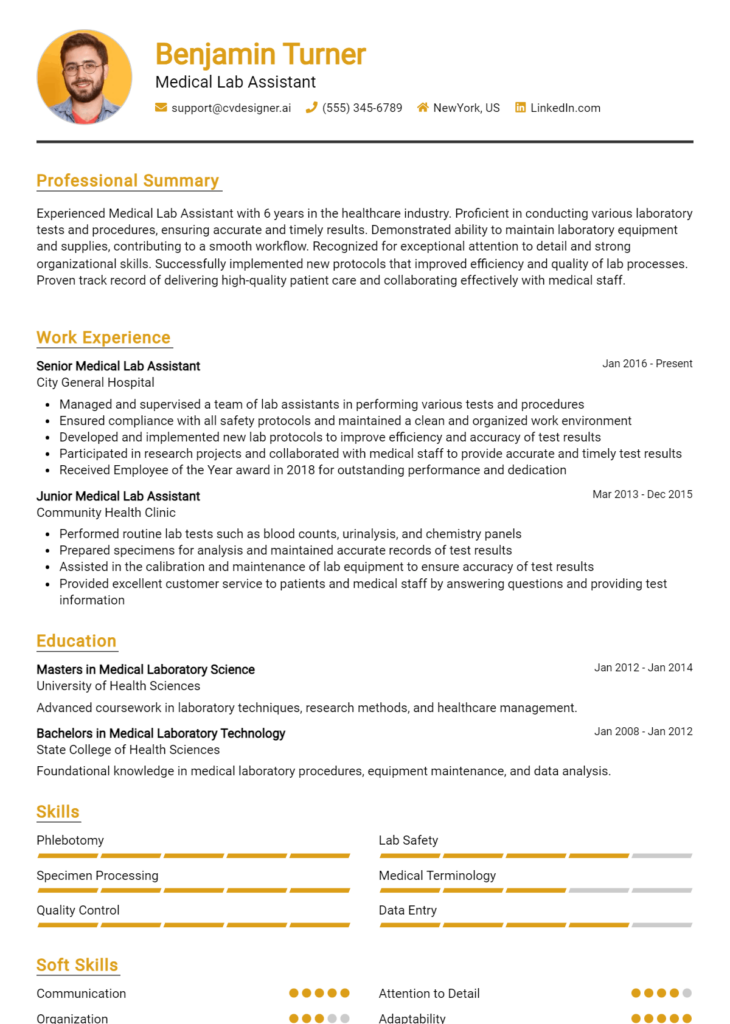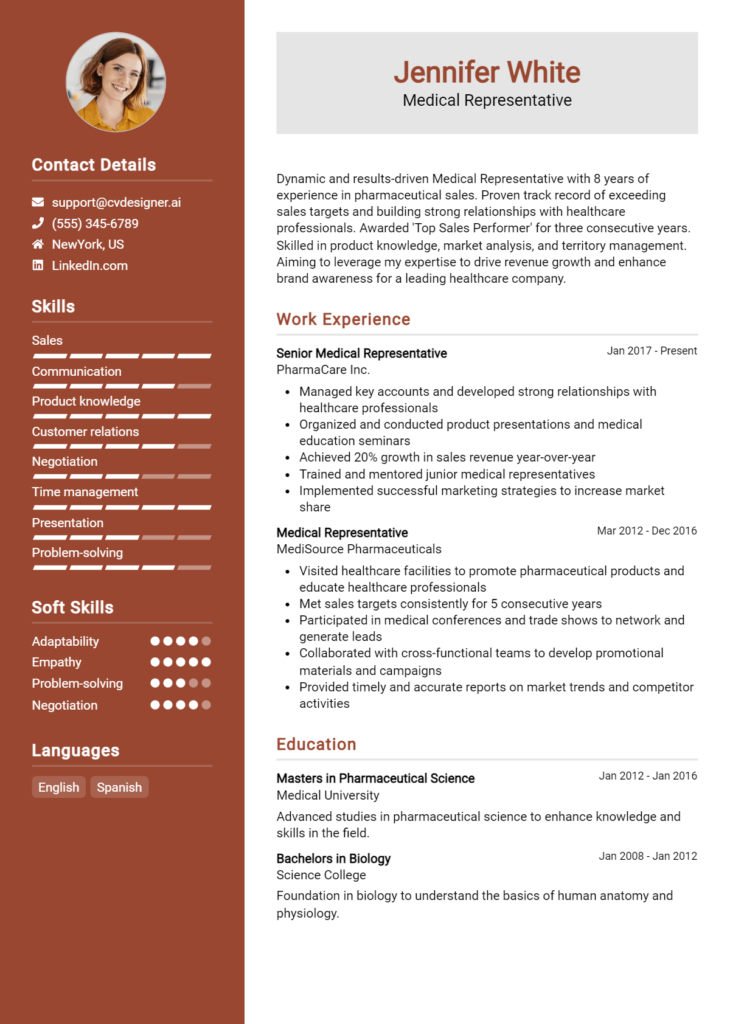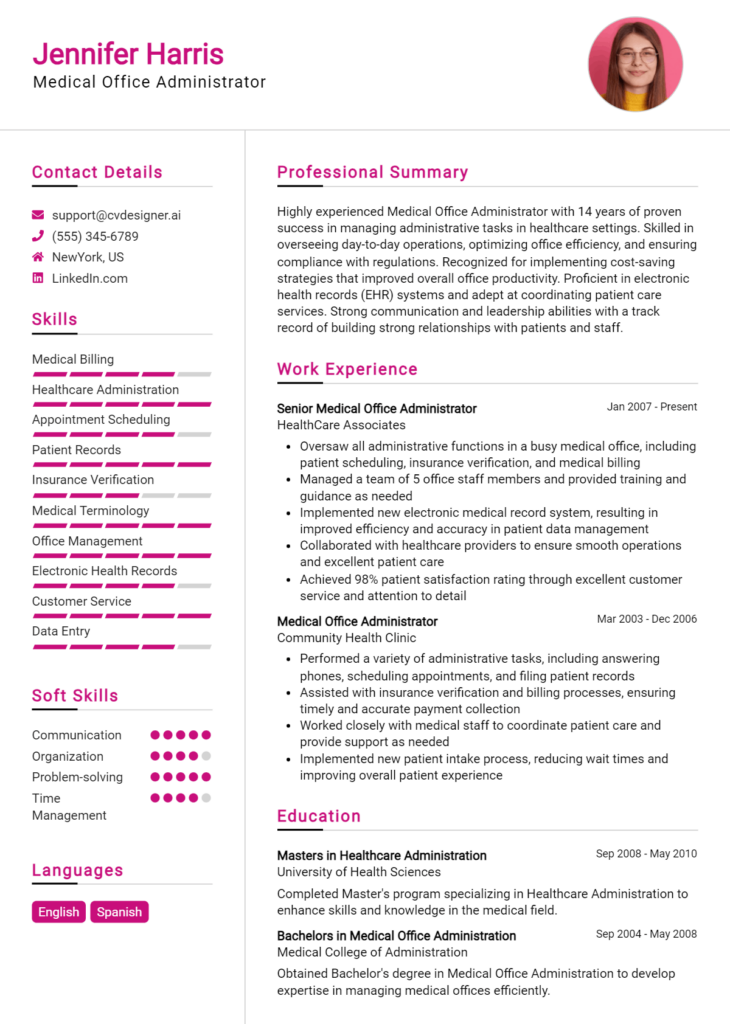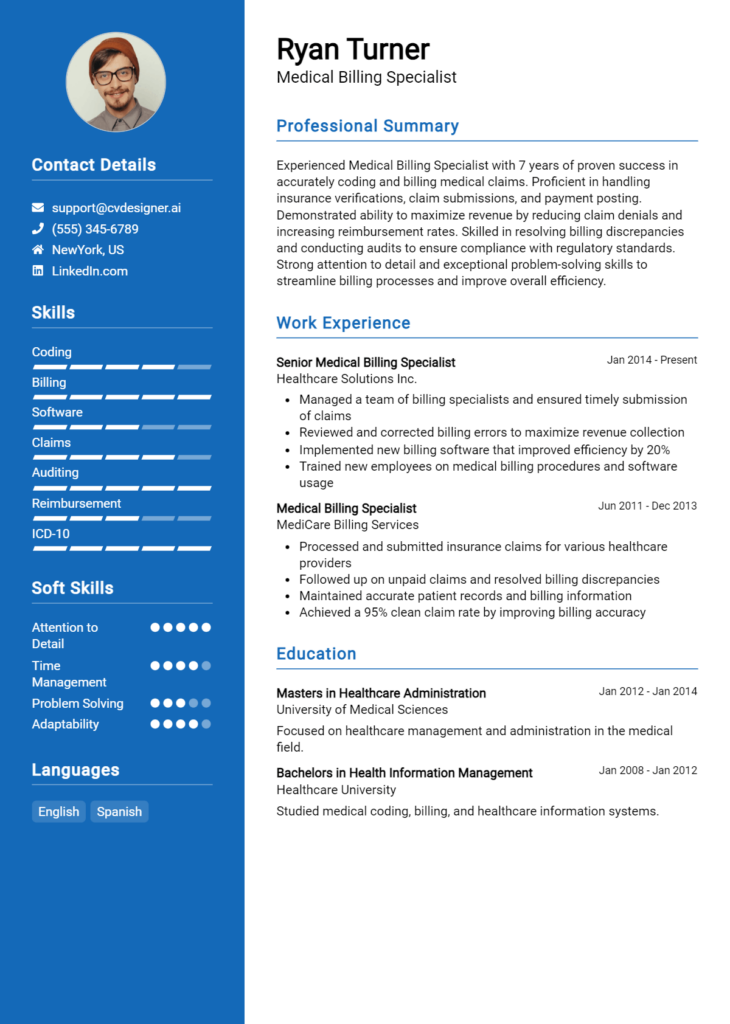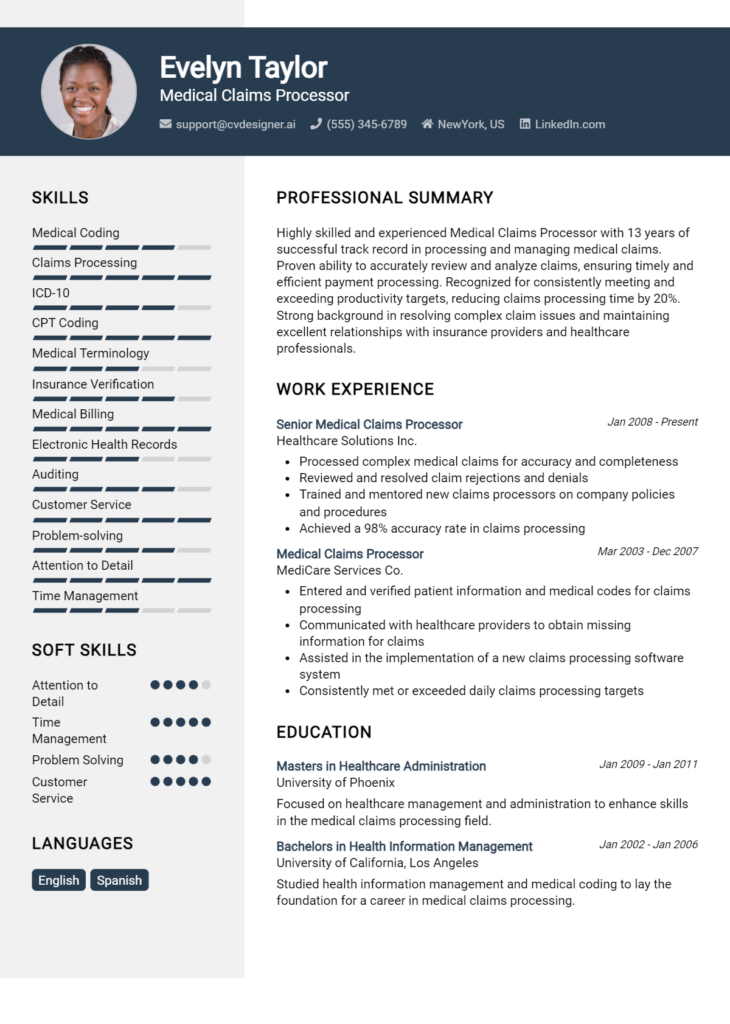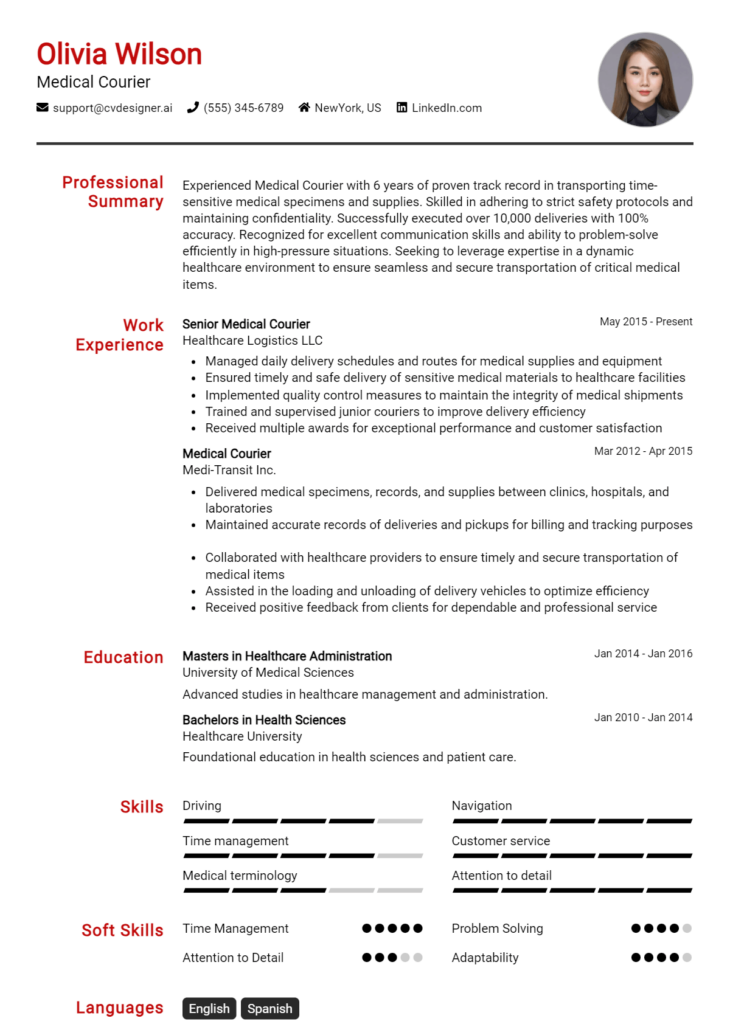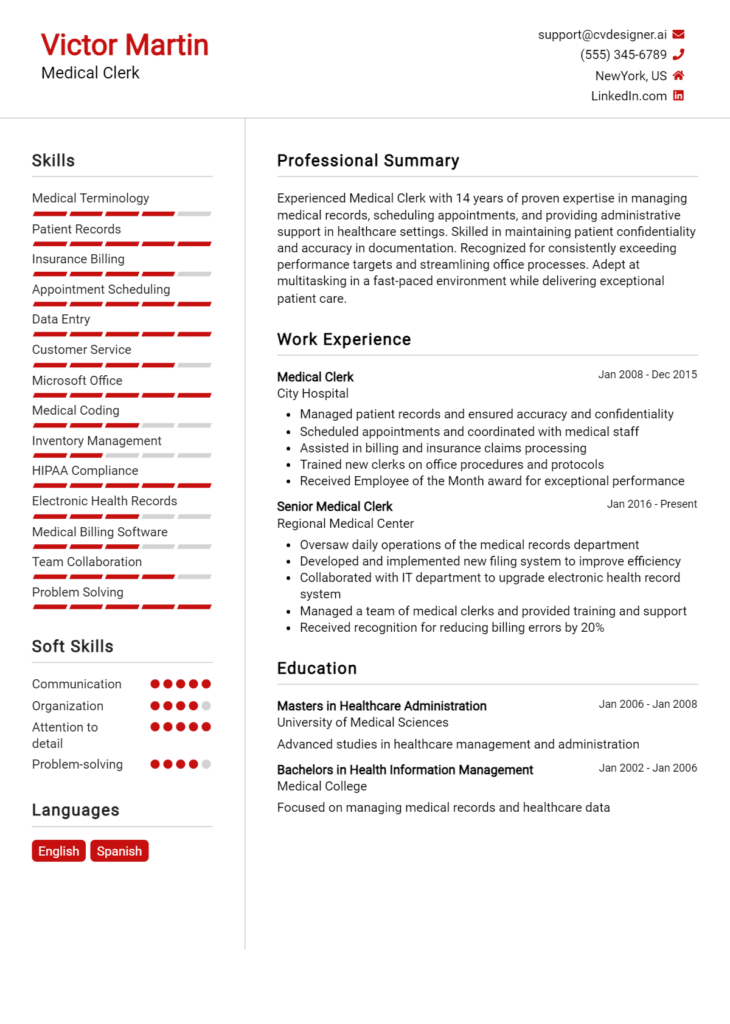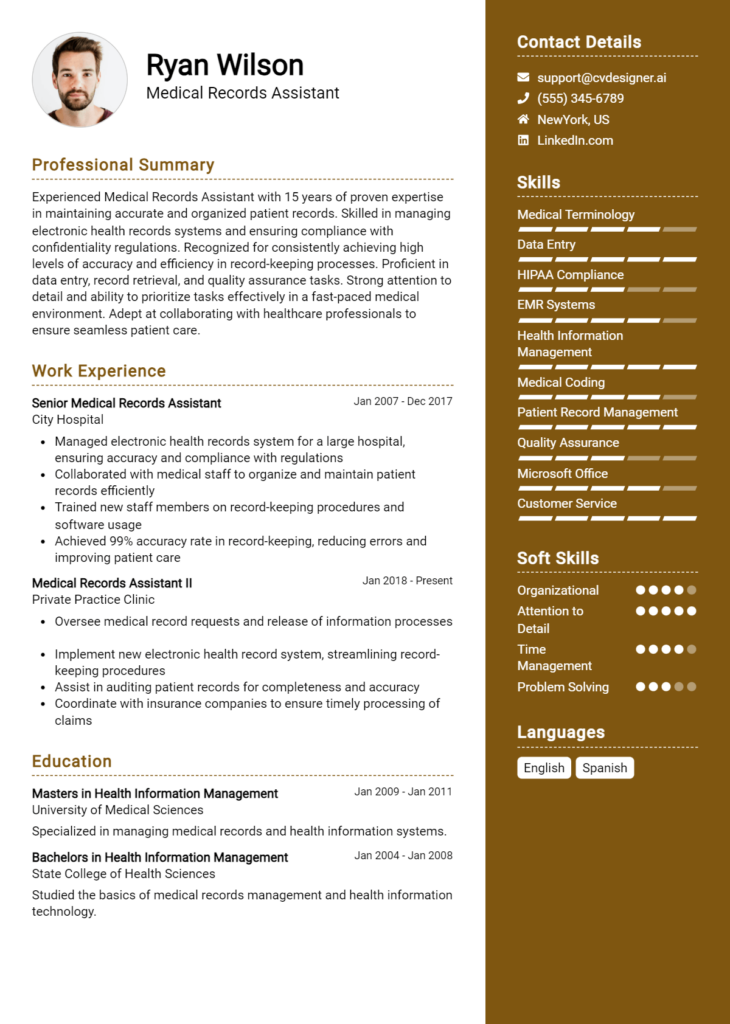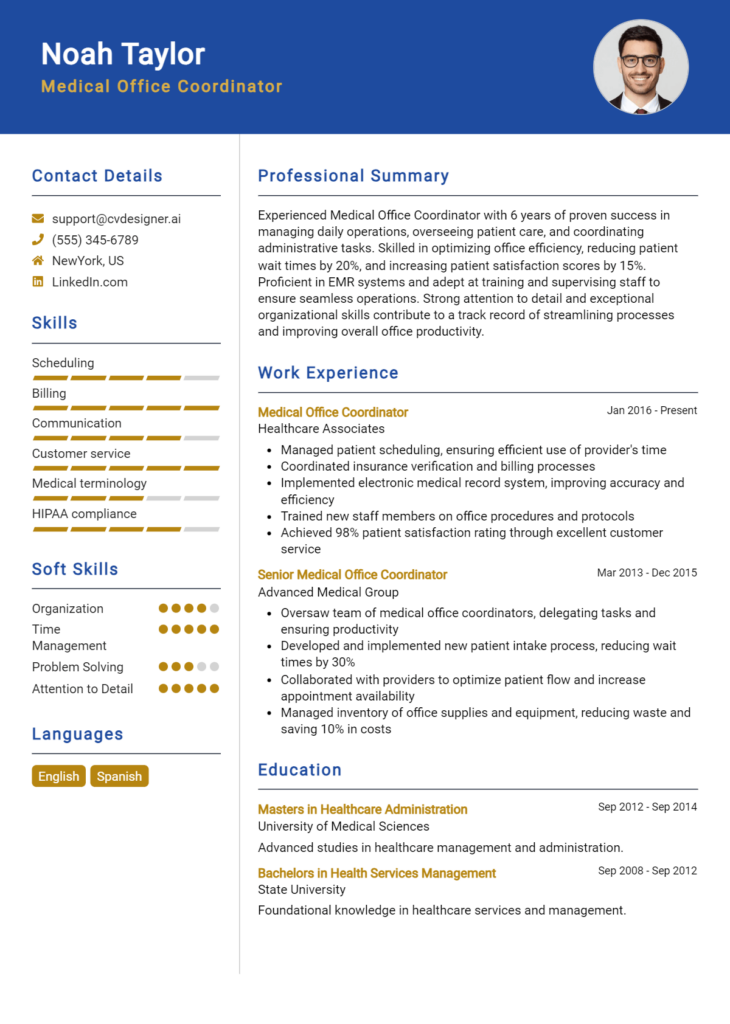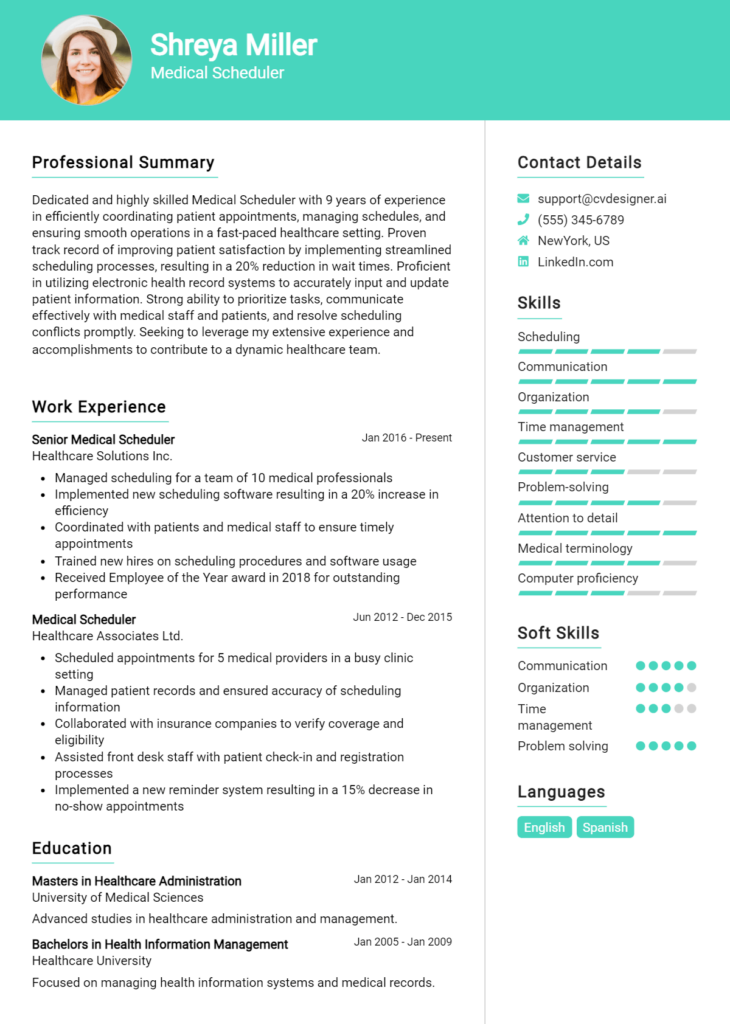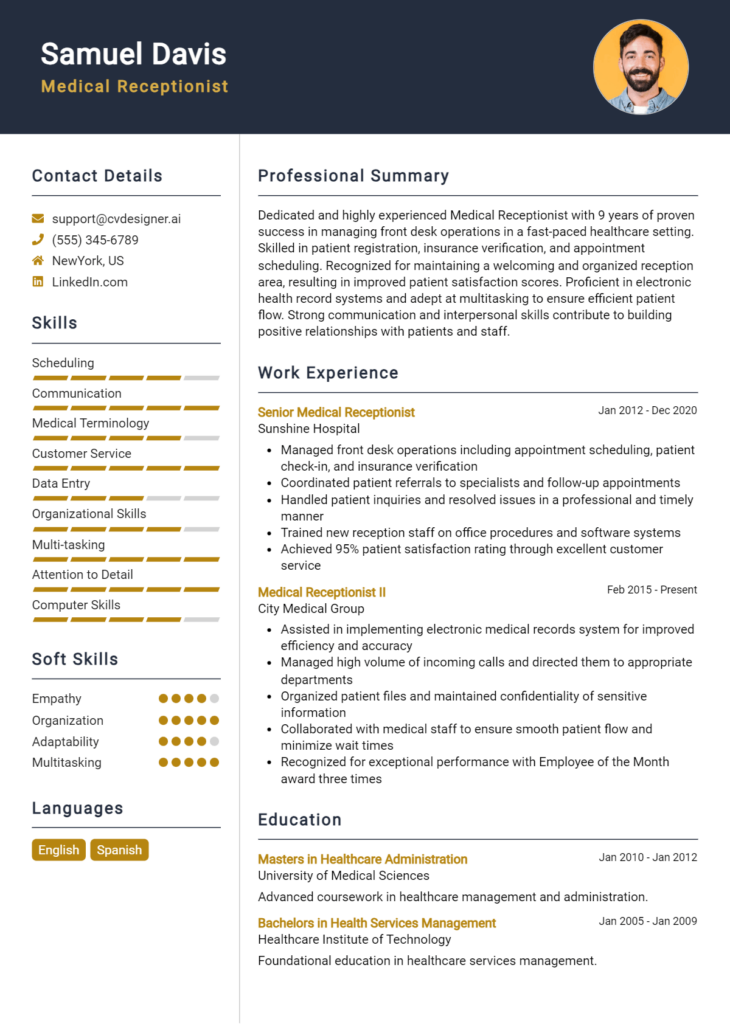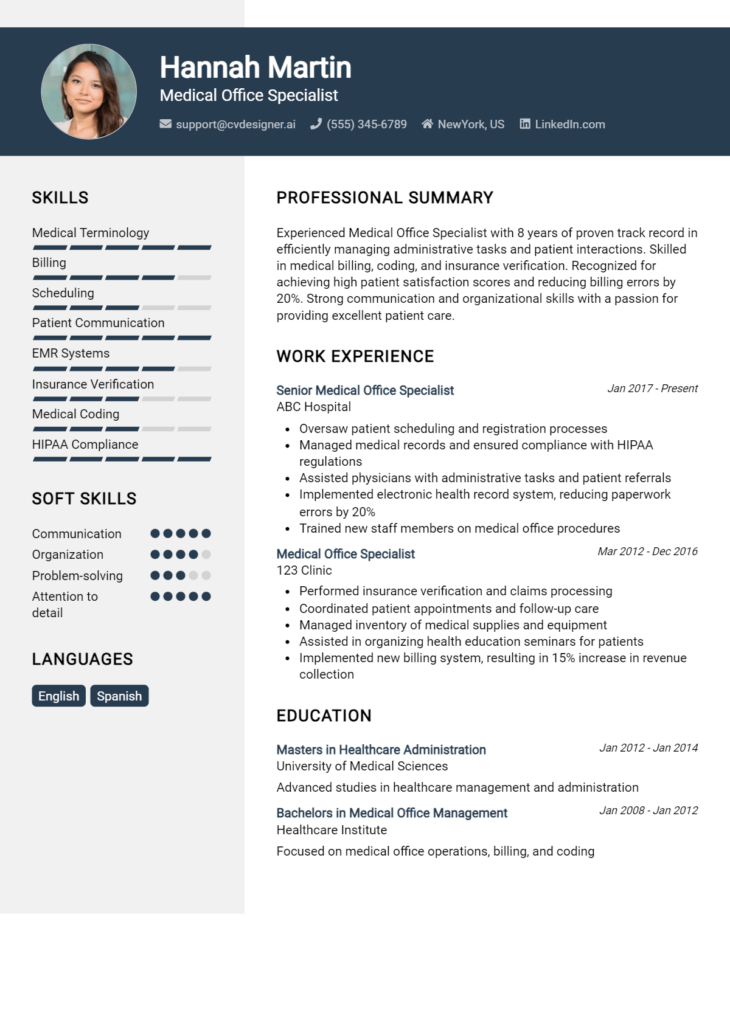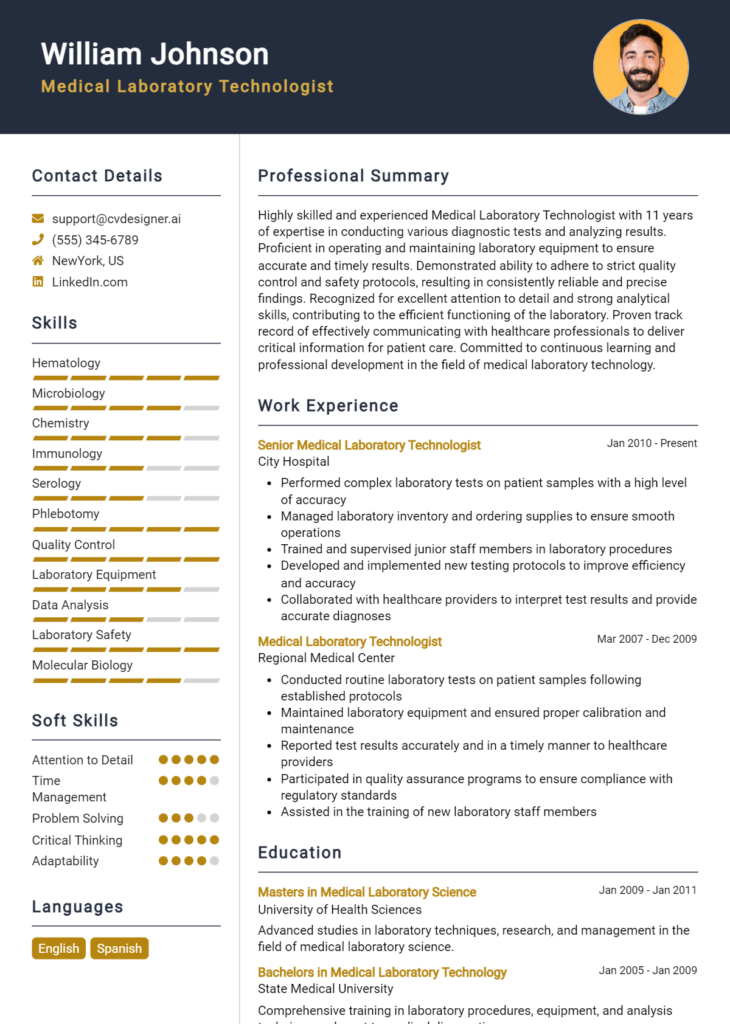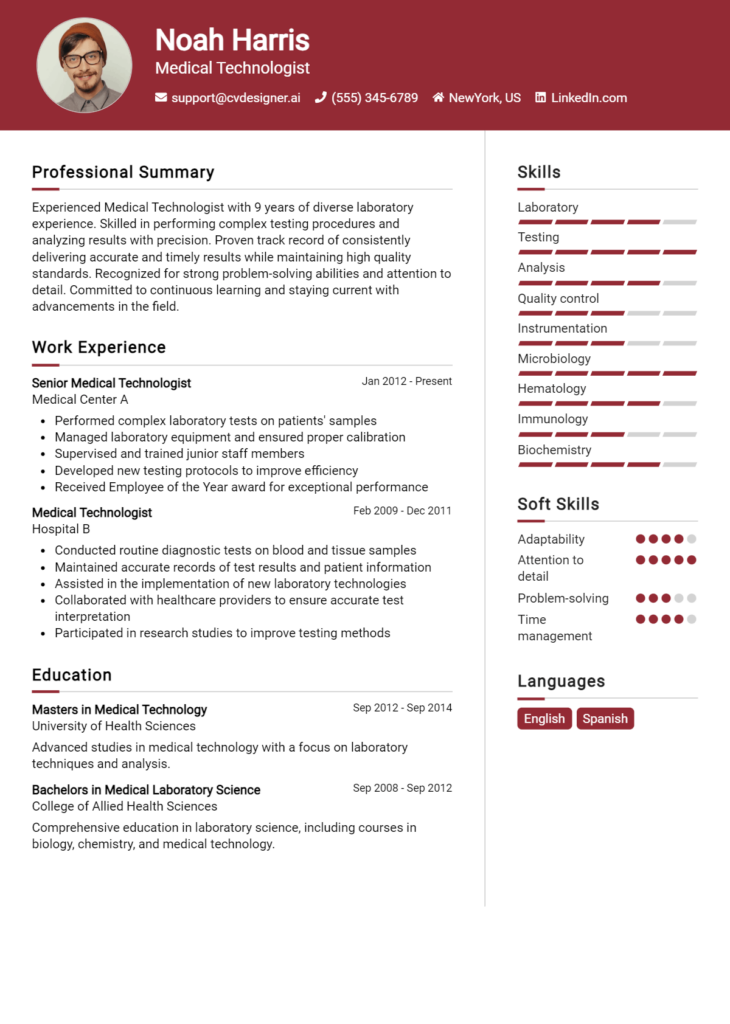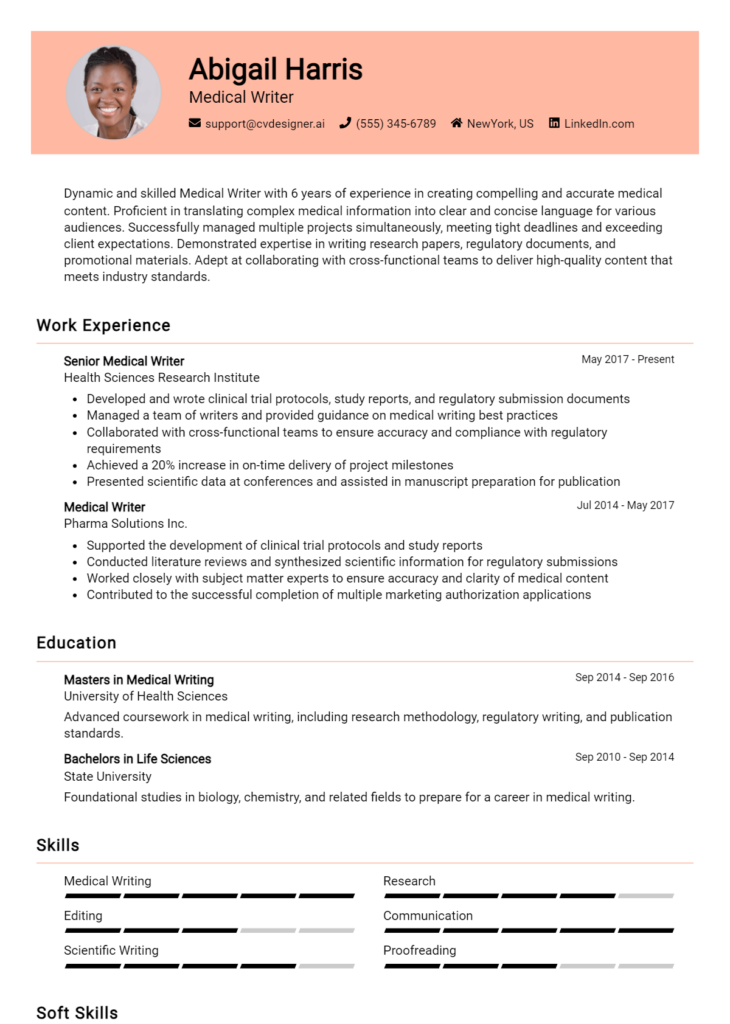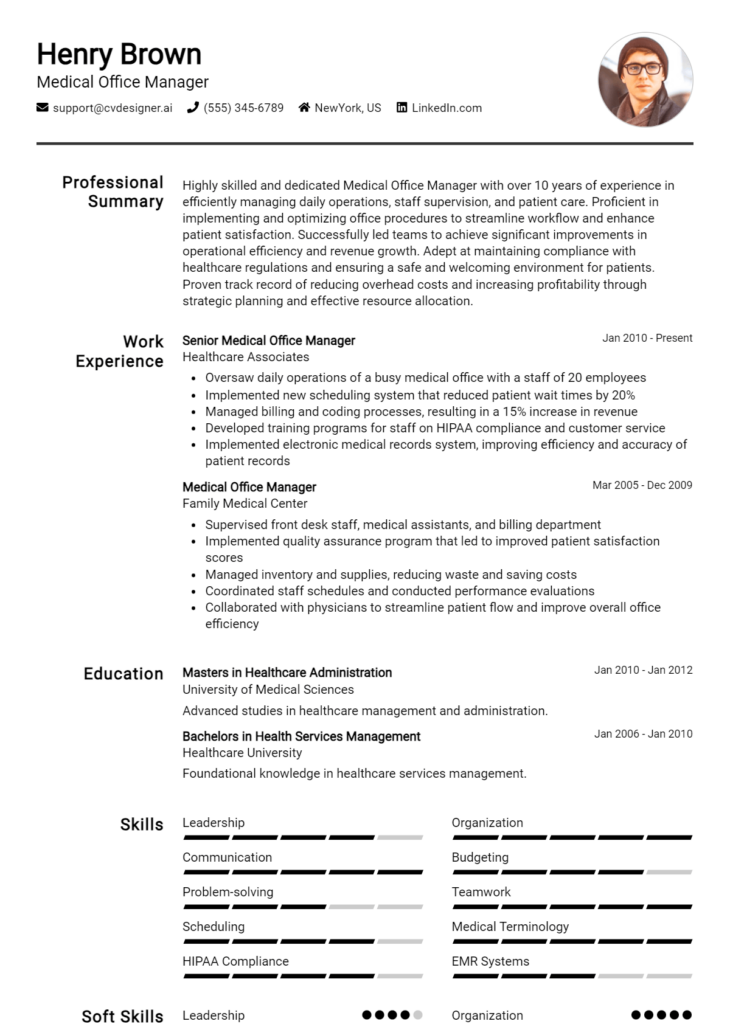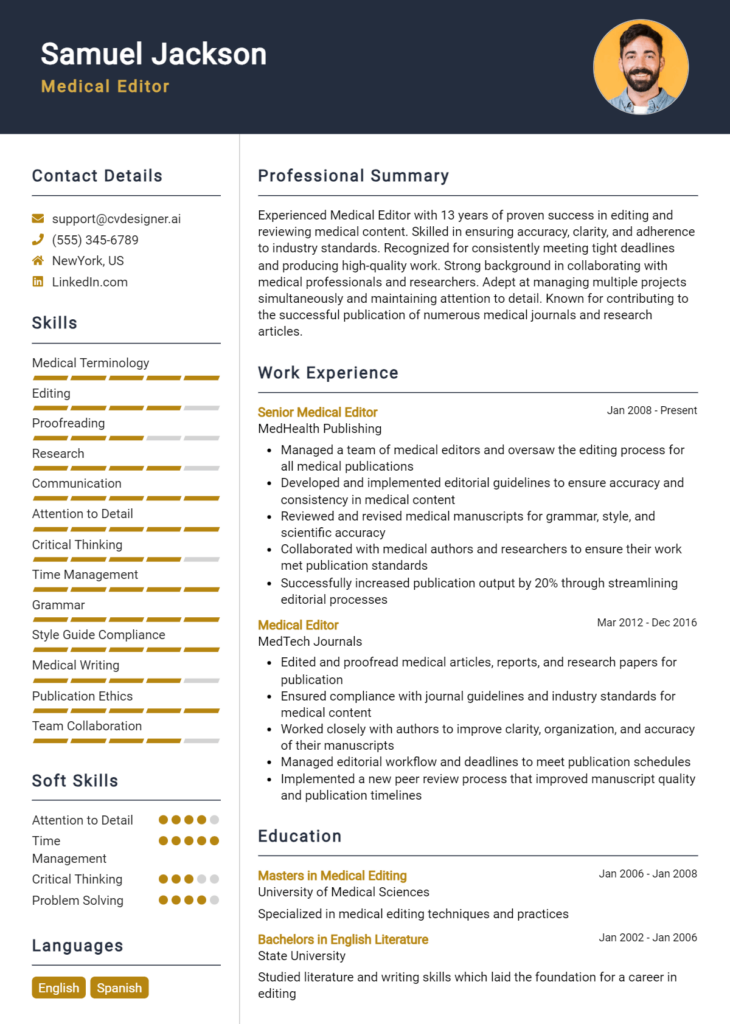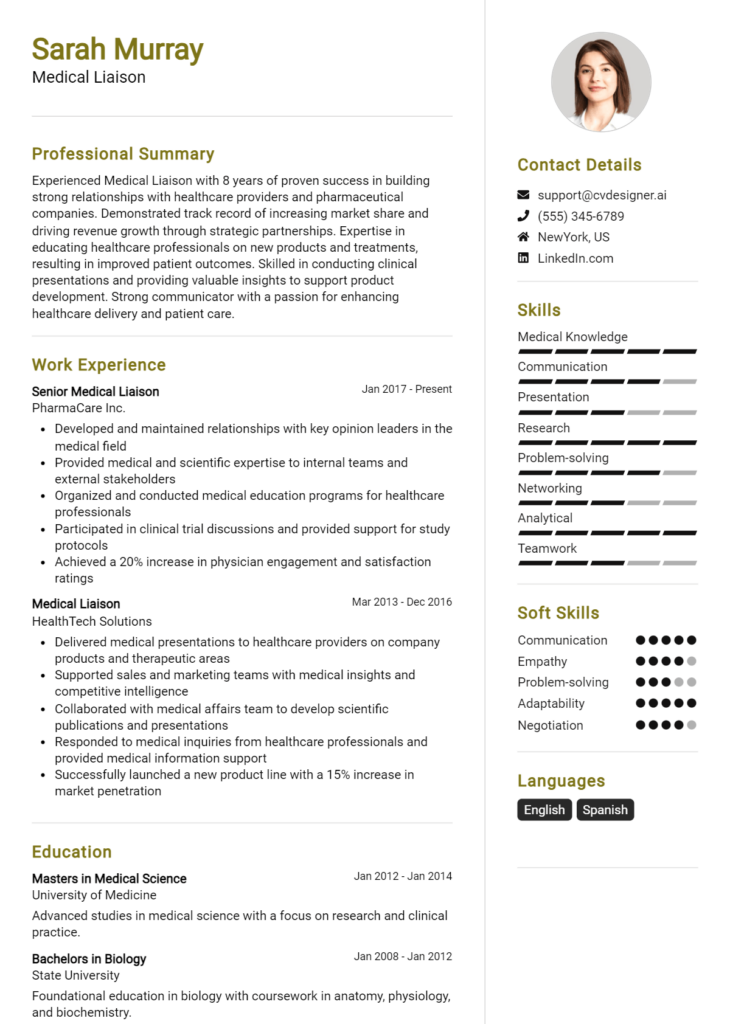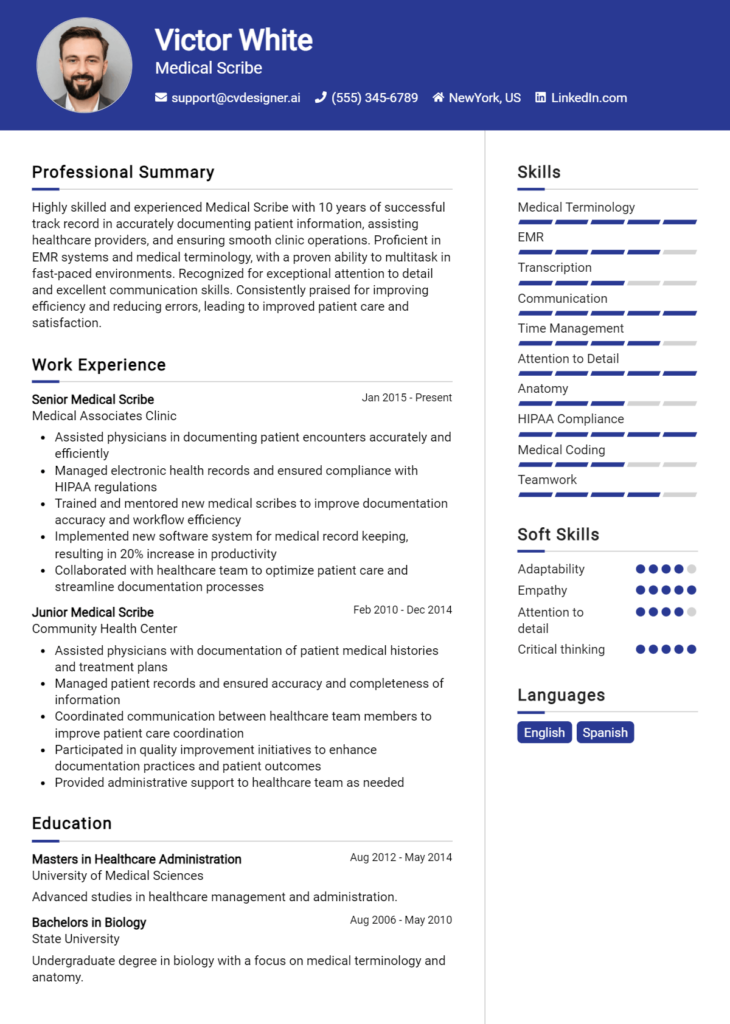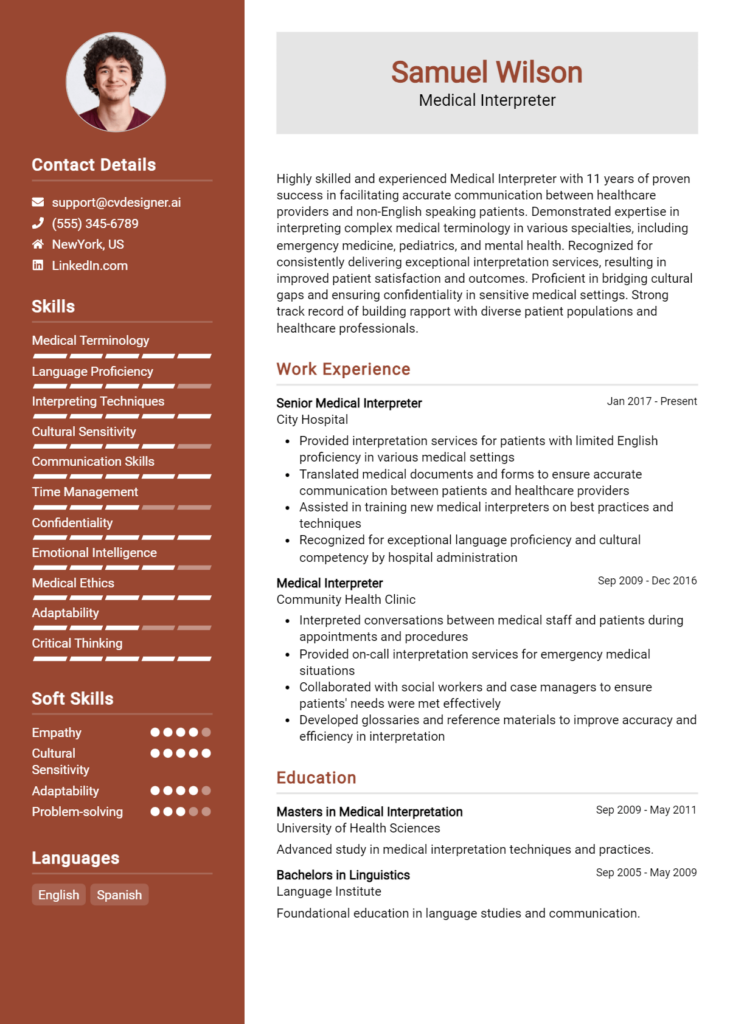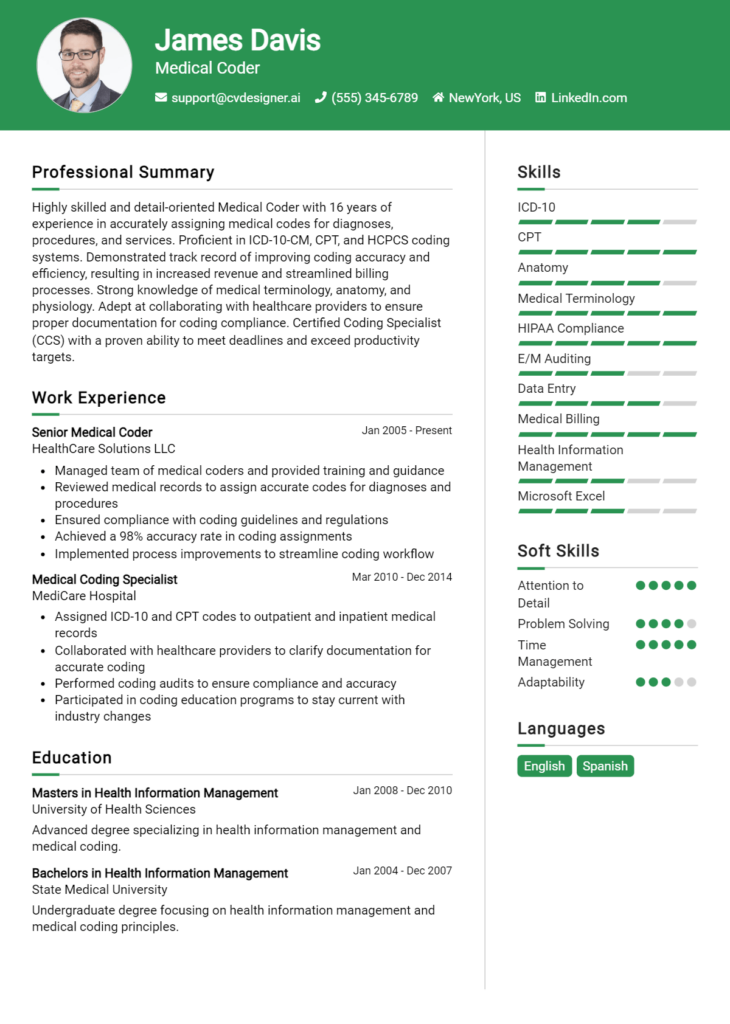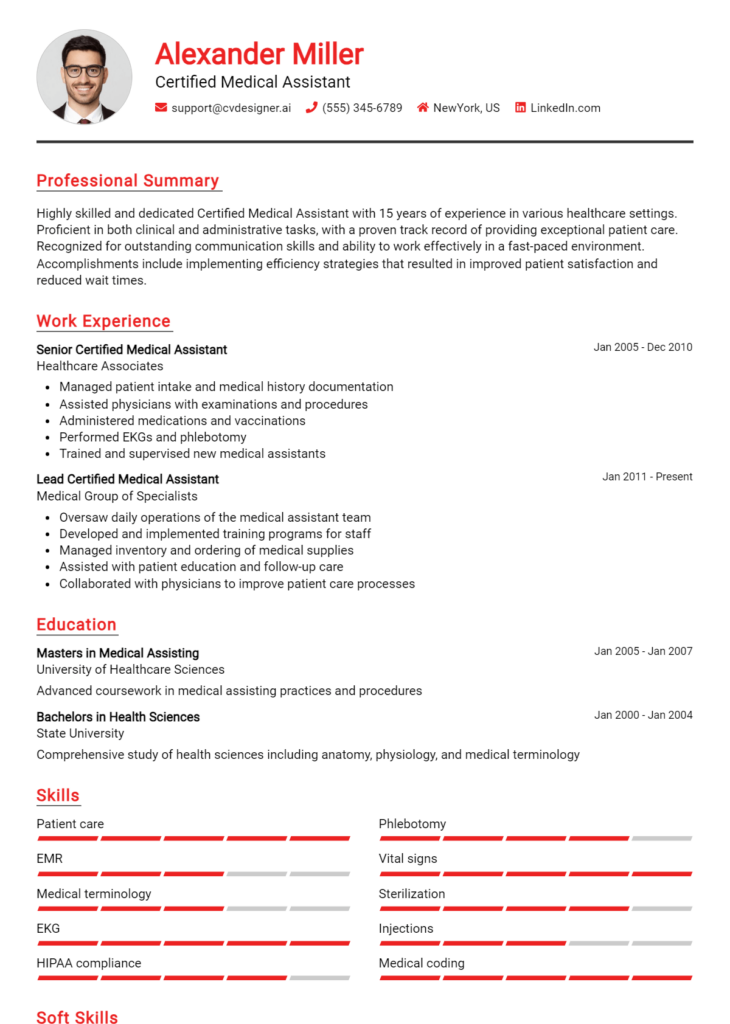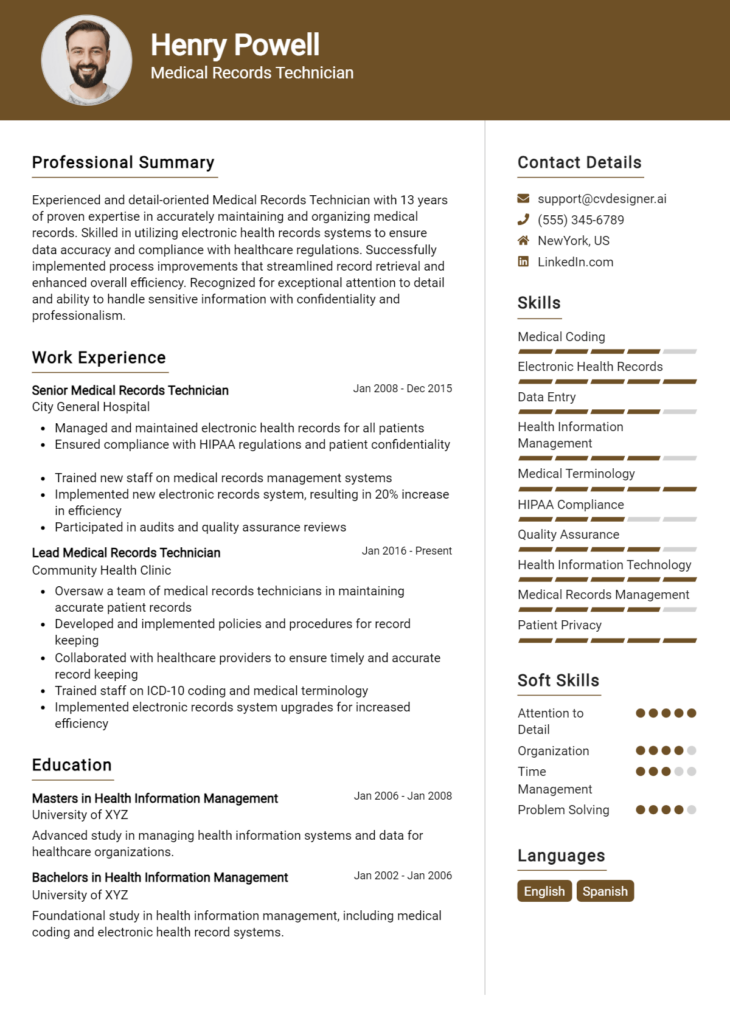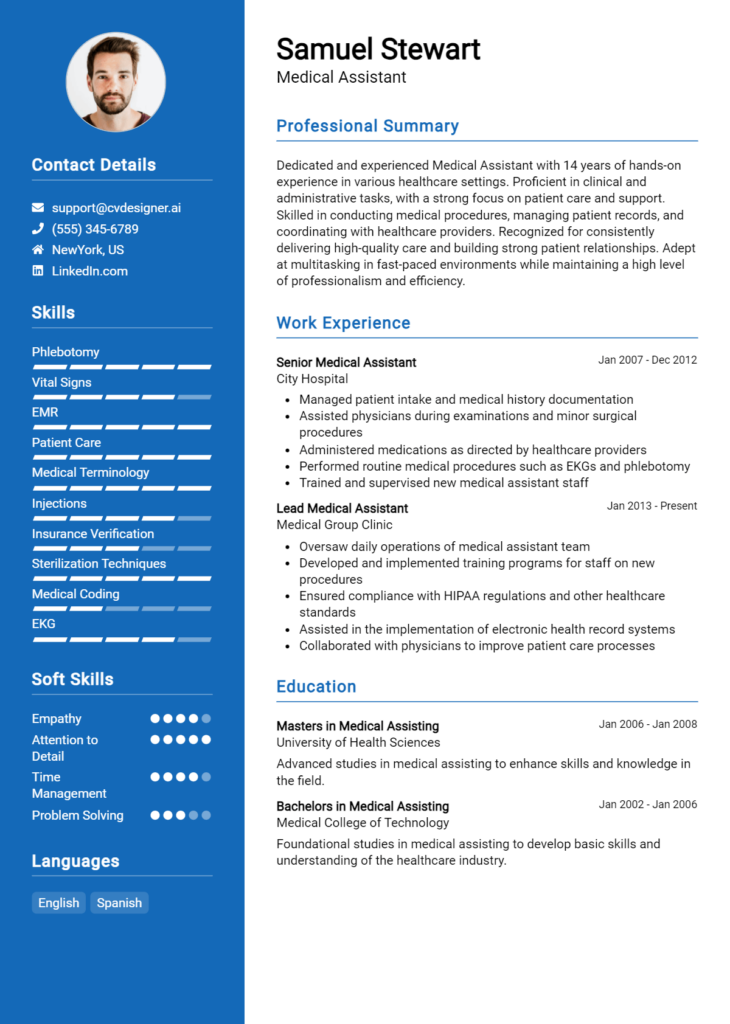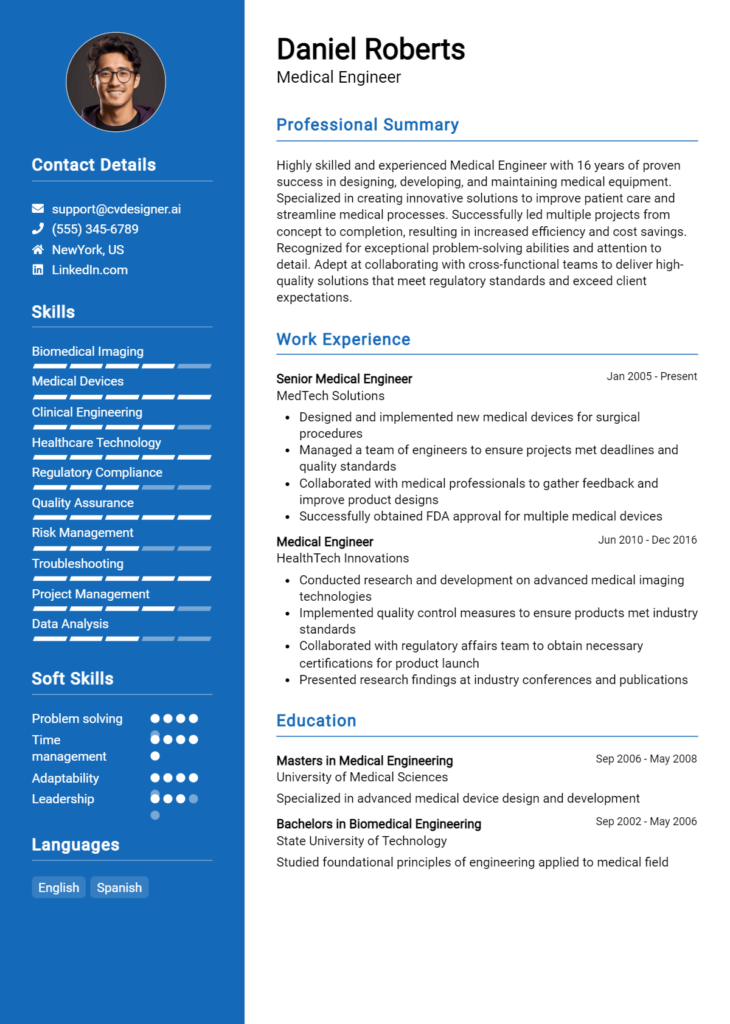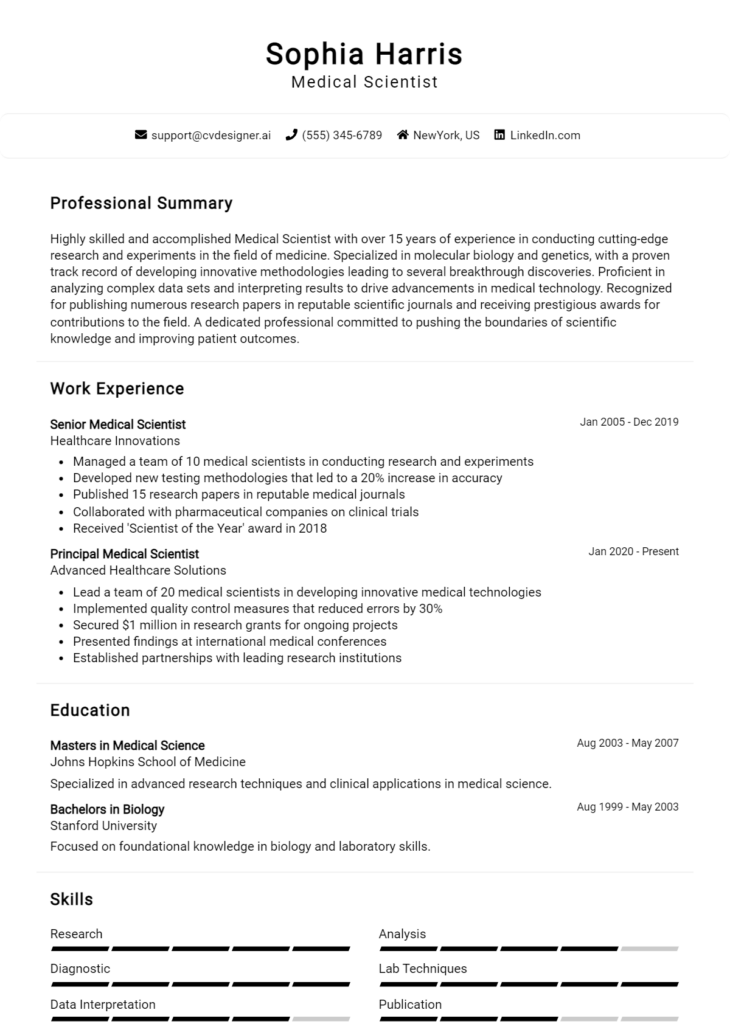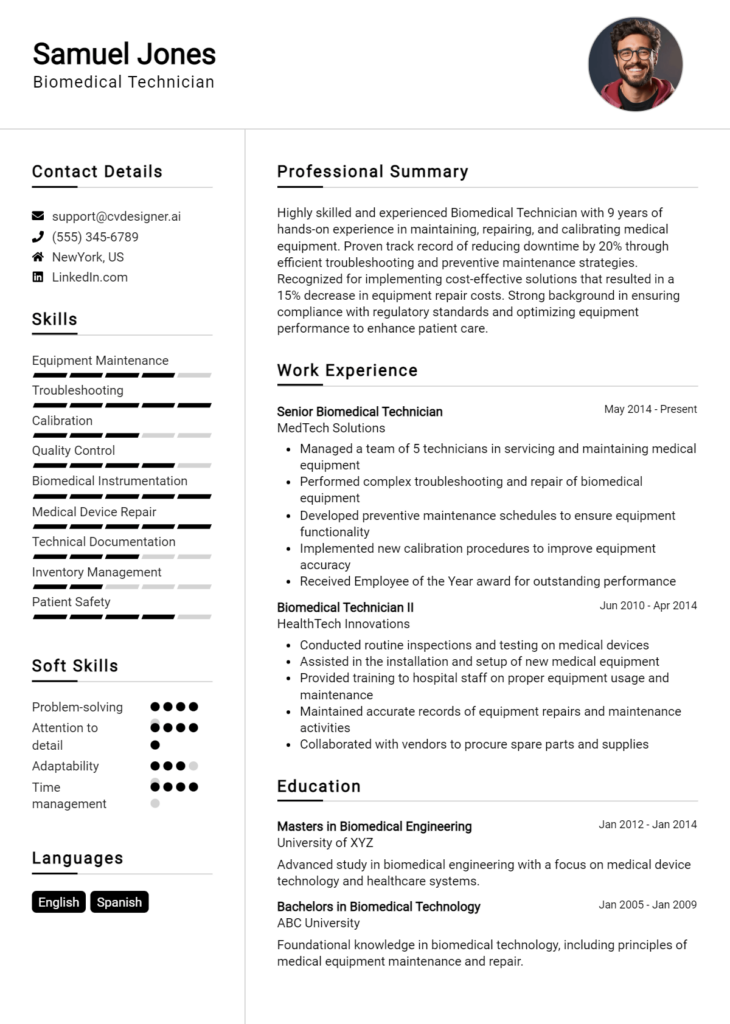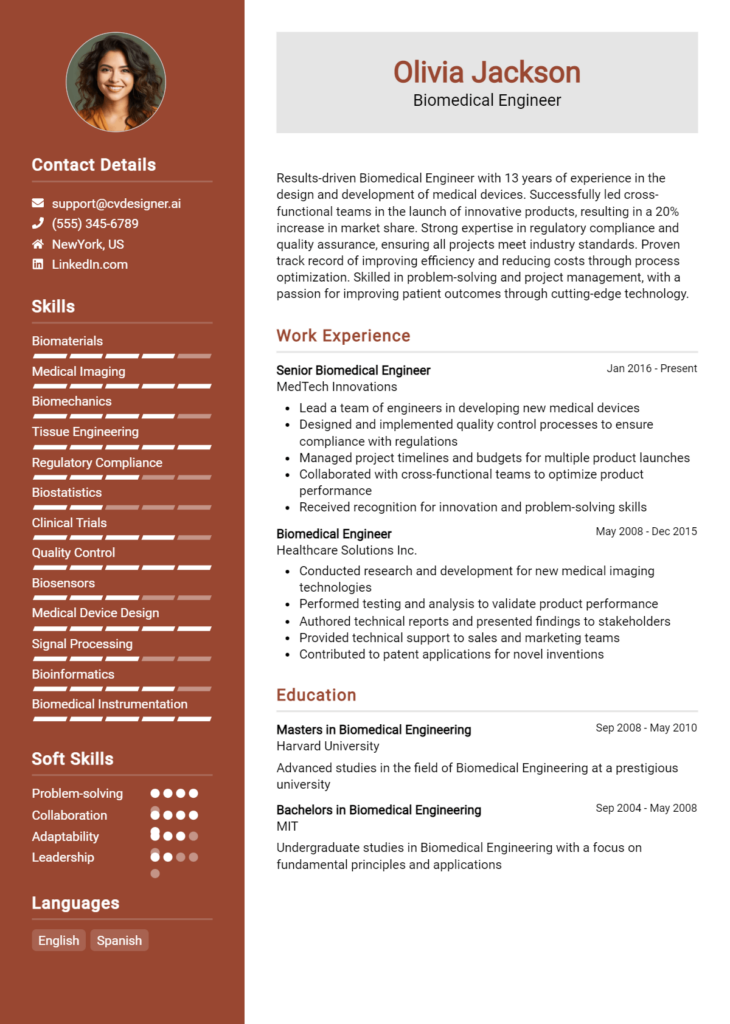Most Popular Medical Records Specialist Resume Examples
Explore additional Medical Records Specialist resume samples and guides and see what works for your level of experience or role.
As the backbone of efficient healthcare systems, Medical Records Specialists play a crucial role in managing patient information and ensuring compliance with regulations. Their expertise not only supports healthcare providers in delivering quality care but also safeguards patient privacy and data integrity. Crafting a well-structured resume is essential for aspiring Medical Records Specialists to stand out in a competitive job market, showcasing their skills and experience effectively. This guide will help you navigate the intricacies of resume writing tailored specifically for this vital role, ensuring you present your qualifications confidently.
In this comprehensive guide, we will cover several key aspects to enhance your resume. You'll learn about the core responsibilities and essential skills that employers look for in a Medical Records Specialist, as well as the best formats to use for maximum impact. We will highlight common mistakes to avoid that could hinder your chances of landing an interview, and provide resume examples suitable for all experience levels. Additionally, we’ll offer valuable tips on crafting a compelling resume and selecting the right templates that align with your professional identity. By the end of this guide, you'll be equipped with the knowledge and tools needed to create a standout resume that opens doors to your dream job in medical records management.
Key Responsibilities and Skills for a Medical Records Specialist
A Medical Records Specialist plays a crucial role in the healthcare industry by managing and organizing patient records to ensure their accuracy, accessibility, and confidentiality. This position involves a variety of responsibilities, including:
- Maintaining Medical Records: Organizing and updating patient records, ensuring they are complete and accurate.
- Data Entry: Accurately inputting patient information into electronic health record (EHR) systems.
- Compliance: Ensuring that all records comply with healthcare regulations and standards, including HIPAA.
- Retrieval and Management: Retrieving patient records for medical staff and managing requests for information.
- Quality Control: Conducting regular audits of records to identify and correct discrepancies.
- Collaboration: Working with healthcare providers, administrative staff, and IT specialists to improve record-keeping processes.
To excel in this role, certain essential skills are required:
- Attention to detail
- Strong organizational skills
- Proficiency in EHR systems and medical coding
- Knowledge of healthcare regulations (e.g., HIPAA)
- Excellent communication skills
- Analytical thinking
- Problem-solving abilities
- Time management
Effectively highlighting these skills in the resume skills section is fundamental for a Medical Records Specialist. Tailoring your skills and responsibilities to the specific job description not only showcases your qualifications but also demonstrates your understanding of the role’s requirements.
Additionally, consider how these skills can be relevant when crafting a strong CV. By aligning your experience and competencies with those outlined in the job posting, you can present yourself as a well-suited candidate for the position, increasing your chances of standing out to potential employers.
Best Resume Format and Structure for a Medical Records Specialist
When crafting a resume for a Medical Records Specialist, it’s essential to choose a format that highlights your skills, experience, and qualifications effectively. Here’s a detailed guide on the best resume format and structure for this role.
Contact Information
- Name: Your full name should be prominently displayed at the top.
- Phone Number: A reliable contact number where you can be reached.
- Email Address: Use a professional email address.
- LinkedIn Profile: (Optional) Include a link to your LinkedIn profile if it's relevant and up-to-date.
- Location: City and state are typically sufficient; a full address is not necessary.
Professional Summary
- Write a concise paragraph (2-4 sentences) that summarizes your experience, skills, and what you bring to the role of a Medical Records Specialist.
- Focus on your expertise in managing medical records, knowledge of relevant regulations (e.g., HIPAA compliance), and any specialized skills (like electronic health record systems).
Work Experience
- List your work history in reverse chronological order, starting with your most recent position.
- For each job, include:
- Job Title: Clearly state your position.
- Company Name: Provide the name of the organization where you worked.
- Location: City and state of the company.
- Dates of Employment: Use a consistent format (e.g., Month/Year – Month/Year).
- Responsibilities and Achievements: Use bullet points to describe your key responsibilities and accomplishments, quantifying your achievements when possible (e.g., "Managed a database of over 5,000 patient records with 99% accuracy").
Education
- Include your highest degree first, followed by any relevant certifications or diplomas.
- For each entry, provide:
- Degree: Specify the type of degree (e.g., Associate's, Bachelor's).
- Field of Study: Mention your major or focus area (e.g., Health Information Management).
- Institution Name: The name of the school or university.
- Graduation Date: Month and year of graduation.
Skills
- List relevant skills that align with the Medical Records Specialist role. These can include:
- Proficiency in electronic health record (EHR) systems.
- Knowledge of medical terminology and coding.
- Strong organizational skills and attention to detail.
- Familiarity with HIPAA regulations.
- Excellent communication and interpersonal skills.
- Use bullet points for clarity and easy reading.
Certifications
- Include any relevant certifications that enhance your qualifications, such as:
- Registered Health Information Technician (RHIT).
- Certified Coding Specialist (CCS).
- Certified Electronic Health Records Specialist (CEHRS).
- For each certification, provide:
- Name of Certification
- Issuing Organization
- Date Earned (or expiration date if applicable).
Tips for Success
- Choose a clean, professional format with clear headings and consistent font styles to enhance readability.
- Use bullet points rather than paragraphs for easier skimming.
- Tailor your resume to the job description, incorporating keywords that the employer uses.
- Keep the resume to one page, especially if you have less than 10 years of experience.
- Use action verbs to convey your responsibilities and achievements effectively.
A well-structured resume complements a corresponding cover letter by providing a comprehensive overview of your qualifications while the cover letter can elaborate on your passion for the role and personal experiences. Ensure both documents maintain a consistent style and tone for a cohesive application package.
Writing Tips and Best Practices for a Medical Records Specialist Resume
When crafting a resume as a Medical Records Specialist, it's crucial to present your skills and experiences in a clear, organized manner that highlights your qualifications for the role. Start by ensuring your resume is easy to read, using a professional layout and format. Incorporate industry-specific keywords related to medical records management, confidentiality, and data entry to pass through applicant tracking systems. Focus on quantifying your achievements to demonstrate your impact in previous roles, and use action verbs to convey your responsibilities and accomplishments effectively. Remember to tailor your resume for each position you apply for, reflecting the specific skills and experiences that align with the job description. Utilizing resume writing tips can greatly enhance the professionalism of your application. These practices also extend to your cover letter; consider how they can help you present your qualifications in a compelling narrative.
- Use action verbs like "managed," "implemented," and "analyzed" to describe your responsibilities.
- Quantify your achievements, such as "reduced record retrieval time by 30%."
- Incorporate industry-specific keywords, such as "HIPAA compliance," "EHR," or "data integrity."
- Highlight relevant certifications, such as Registered Health Information Technician (RHIT) or Certified Coding Specialist (CCS).
- Maintain consistent formatting, including font style and size, to ensure professionalism.
- Keep your resume concise, ideally one page, unless you have extensive relevant experience.
- Customize your resume for each job application by aligning your skills with the job description.
- Proofread your resume multiple times to eliminate any grammatical or typographical errors.
Common Mistakes to Avoid in a Medical Records Specialist Resume
Crafting a compelling resume as a Medical Records Specialist requires careful attention to detail, as even minor mistakes can diminish your chances of landing an interview. Many candidates fall into the trap of common pitfalls that can detract from their qualifications and experience. To ensure your resume stands out for the right reasons, it’s essential to be aware of these common mistakes:
- Overloading the resume with excessive information that can overwhelm the reader.
- Using generic descriptions that fail to highlight specific skills or achievements.
- Failing to tailor the resume to the specific job description and employer needs.
- Ignoring formatting consistency, which can make the resume appear unprofessional.
- Listing job duties instead of emphasizing accomplishments and contributions.
- Neglecting to include relevant keywords that applicant tracking systems (ATS) might look for.
- Using inappropriate language or jargon that may not be understood by all readers.
- Forgetting to proofread for spelling and grammatical errors, which can undermine credibility.
- Not including quantifiable data to demonstrate the impact of your work.
- Omitting contact information or using an unprofessional email address.
To further refine your application materials, consider reviewing the common mistakes to avoid in a resume. Additionally, don’t overlook the importance of your cover letter; ensure you avoid common cover letter mistakes to present a cohesive and professional image to potential employers.
Sample Medical Records Specialist Resumes
A Medical Records Specialist plays a crucial role in healthcare organizations by managing patient records and ensuring the accuracy and confidentiality of medical information. Whether you are an experienced professional, an entry-level candidate, or someone looking to transition into this field, having a well-crafted resume is essential to showcase your skills and qualifications. Below are three sample resumes tailored for different experience levels in the Medical Records Specialist profession.
Experienced Medical Records Specialist Resume
Jane Doe
123 Health St.
City, State, Zip
(123) 456-7890
janedoe@email.com
Professional Summary
Detail-oriented Medical Records Specialist with over 7 years of experience in managing patient records, ensuring compliance with HIPAA regulations, and improving efficiency in medical record-keeping systems. Proven track record of maintaining data integrity while supporting healthcare providers in delivering high-quality patient care.
Experience
Senior Medical Records Specialist
ABC Health Center, City, State
March 2018 – Present
- Oversee a team of 5 medical records clerks and ensure timely processing of patient records.
- Implemented an electronic health record (EHR) system that increased record retrieval efficiency by 40%.
- Conduct regular audits to ensure compliance with HIPAA and other regulatory requirements.
- Train new staff on medical records protocols and EHR usage.
Medical Records Clerk
XYZ Hospital, City, State
June 2015 – February 2018
- Managed patient information and ensured accurate data entry into the medical records system.
- Assisted in the transition from paper to electronic records, achieving a seamless integration process.
- Responded to requests for patient files from healthcare providers and insurance companies, maintaining confidentiality.
Education
Associate Degree in Health Information Technology
City Community College, City, State
Graduated: May 2015
Entry-Level Medical Records Specialist Resume
John Smith
456 Care Ave.
City, State, Zip
(987) 654-3210
johnsmith@email.com
Professional Summary
Motivated and detail-oriented recent graduate with a degree in Health Information Management. Eager to apply knowledge of medical coding and electronic health record systems in a challenging Medical Records Specialist role. Committed to ensuring the accuracy and security of patient information.
Education
Bachelor of Science in Health Information Management
University of Health Sciences, City, State
Graduated: May 2023
Internship Experience
Health Information Intern
City General Hospital, City, State
January 2023 – April 2023
- Assisted in the organization and management of patient records, ensuring compliance with HIPAA regulations.
- Supported the transition to an EHR system by digitizing paper records and verifying data accuracy.
- Provided customer service support to patients seeking access to their medical files.
Skills
- Proficient in EHR software and Microsoft Office Suite
- Strong attention to detail and organizational skills
- Basic knowledge of medical coding and billing practices
Career Changer Medical Records Specialist Resume
Emily Johnson
789 Wellness Blvd.
City, State, Zip
(321) 654-0987
emilyjohnson@email.com
Professional Summary
Dedicated professional with 5 years of administrative experience in a fast-paced environment, seeking to transition into the Medical Records Specialist role. Strong organizational skills, attention to detail, and a commitment to maintaining confidentiality in handling sensitive information.
Experience
Administrative Assistant
HealthTech Solutions, City, State
June 2018 – Present
- Managed office operations, including filing and organizing patient information, ensuring accuracy and confidentiality.
- Coordinated communication between healthcare providers and patients, facilitating the flow of information.
- Developed and implemented a new filing system that improved document retrieval time by 30%.
Customer Service Representative
XYZ Retail, City, State
January 2015 – May 2018
- Provided exceptional customer service, resolving inquiries related to products and services.
- Maintained accurate records of customer transactions, demonstrating strong attention to detail.
Education
Certificate in Health Information Management
City Technical Institute, City, State
Completed: December 2022
For more inspiration, feel free to explore additional resume templates. Also, corresponding cover letter examples can help you create a complete job application package.
Checklist for a Medical Records Specialist Resume
- Proofread for Errors: Carefully review your resume for any spelling, grammar, or punctuation mistakes. Consider reading it aloud or having a friend review it for a fresh perspective.
- Check Formatting Consistency: Ensure that fonts, sizes, and bullet points are consistent throughout the document. This helps maintain a professional appearance.
- Tailor to the Job Description: Customize your resume to align with the specific job you are applying for. Highlight relevant skills and experiences that match the requirements listed in the job posting.
- Highlight Key Skills: Make sure to include essential skills relevant to the Medical Records Specialist role, such as data entry, attention to detail, and knowledge of medical coding.
- Include Relevant Certifications: If you have certifications related to medical records management or coding, ensure they are prominently displayed in your resume.
- Use Action Verbs: Start bullet points with strong action verbs (e.g., managed, organized, maintained) to convey your contributions effectively.
- Quantify Achievements: Whenever possible, include numbers or statistics to demonstrate your accomplishments (e.g., "reduced filing errors by 20%").
- Keep It Concise: Limit your resume to one or two pages, focusing on the most relevant information and avoiding unnecessary details.
- Utilize an AI Resume Builder: Consider using an AI resume builder to help you organize your resume efficiently and ensure all elements are well-structured.
- Follow a Similar Checklist for Other Applications: Adapt this checklist for creating a CV or cover letter to maintain consistency across all your job application materials.
Key Takeaways for a Medical Records Specialist Resume Guide
In conclusion, crafting a standout resume as a Medical Records Specialist requires attention to detail and a clear presentation of your skills and experience. By utilizing the examples and tips provided in this guide, you can effectively highlight your qualifications and make a strong impression on potential employers. We encourage you to take the next step by downloading a resume template from resume templates, exploring our selection of cover letter templates, or using our intuitive resume maker to streamline the process. Remember, adhering to similar guidelines will also enhance the quality of your CV and cover letter, making them compelling and professional. For additional guidance, feel free to check out our resources on creating an impactful CV and writing an effective cover letter. Take charge of your career journey today!
